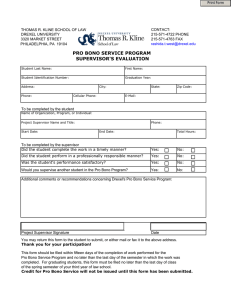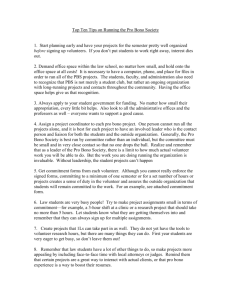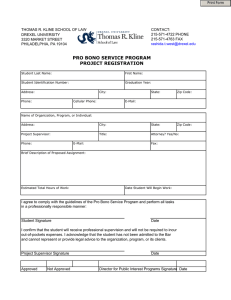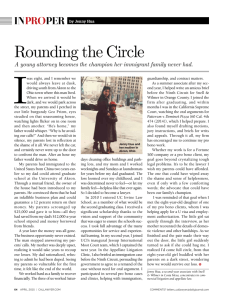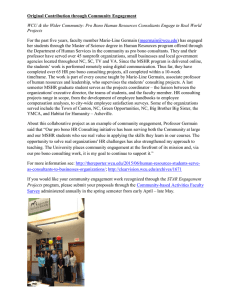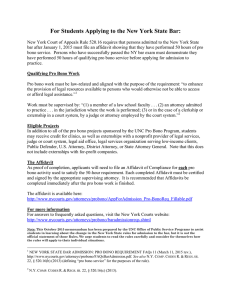Pro Bono Firm Of 2013: Gibson Dunn Karlee Weinmann
advertisement
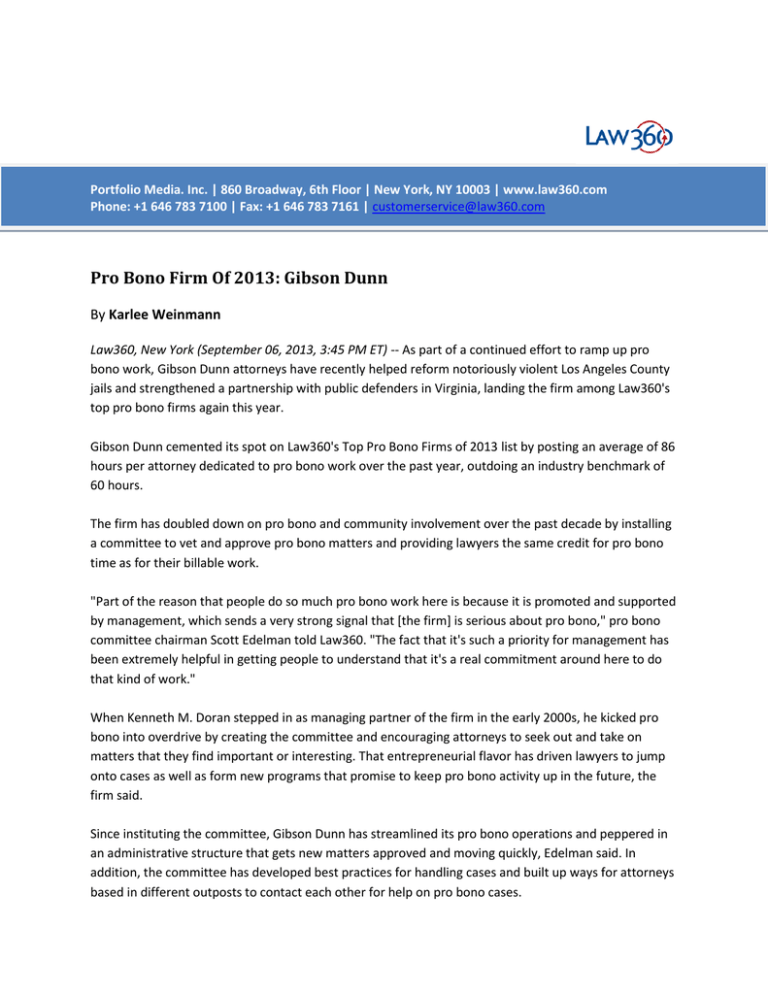
Portfolio Media. Inc. | 860 Broadway, 6th Floor | New York, NY 10003 | www.law360.com Phone: +1 646 783 7100 | Fax: +1 646 783 7161 | customerservice@law360.com Pro Bono Firm Of 2013: Gibson Dunn By Karlee Weinmann Law360, New York (September 06, 2013, 3:45 PM ET) -- As part of a continued effort to ramp up pro bono work, Gibson Dunn attorneys have recently helped reform notoriously violent Los Angeles County jails and strengthened a partnership with public defenders in Virginia, landing the firm among Law360's top pro bono firms again this year. Gibson Dunn cemented its spot on Law360's Top Pro Bono Firms of 2013 list by posting an average of 86 hours per attorney dedicated to pro bono work over the past year, outdoing an industry benchmark of 60 hours. The firm has doubled down on pro bono and community involvement over the past decade by installing a committee to vet and approve pro bono matters and providing lawyers the same credit for pro bono time as for their billable work. "Part of the reason that people do so much pro bono work here is because it is promoted and supported by management, which sends a very strong signal that [the firm] is serious about pro bono," pro bono committee chairman Scott Edelman told Law360. "The fact that it's such a priority for management has been extremely helpful in getting people to understand that it's a real commitment around here to do that kind of work." When Kenneth M. Doran stepped in as managing partner of the firm in the early 2000s, he kicked pro bono into overdrive by creating the committee and encouraging attorneys to seek out and take on matters that they find important or interesting. That entrepreneurial flavor has driven lawyers to jump onto cases as well as form new programs that promise to keep pro bono activity up in the future, the firm said. Since instituting the committee, Gibson Dunn has streamlined its pro bono operations and peppered in an administrative structure that gets new matters approved and moving quickly, Edelman said. In addition, the committee has developed best practices for handling cases and built up ways for attorneys based in different outposts to contact each other for help on pro bono cases. The most intensive pro bono project of the past 12 months for Gibson Dunn racked up 1,521 lawyerhours of work – the most of any unpaid matter. A pair of the firm's partners, Marcellus McRae and Maurice Suh, counseled a Los Angeles County Board of Supervisors commission in its review of excessive force used in area jails and recommended ways to correct the problem in an effort to restore depleting public confidence in law enforcement. McRae, who formerly worked in the U.S. District Attorney's Office in Los Angeles, said he was drawn in because of the chance to be part of an investigation aiming to enforce needed change within a government-run system. Pro bono work in that realm is alluring to former prosecutors who have the advantage of an insider's perspective on how such operations function, he said. "You always have a connection with law enforcement," McRae told Law360. "You want to see it done the best way it can be, and it really is an honor." Through a lengthy investigation, the partners pored over dozens of interviews with sheriff's deputies as well as inmates and other experts. Their work culminated in a 200-page report, issued last fall, that condemned a legacy of overzealous law enforcement within jails and an extreme lack of oversight from top brass within the Los Angeles County Sheriff's Department. The document encouraged a restructuring of jail leadership, including special training and more investigations into inmate injuries. The board accepted the report and is now working to implement the improvements it recommends. In another wide-reaching effort, Gibson Dunn attorneys deepened a partnership with the federal public defender for the Eastern District of Virginia. Gibson Dunn attorneys put in more than 1,500 pro bono hours to help defend the office's clients over the past year. Last spring, a pair of Gibson Dunn attorneys lodged a successful appeal that saved a pro bono client from stiff wire fraud charges stemming from his resale of computer routers. The lawyers successfully argued for dismissal of certain counts, saying the charges were rooted in an overzealous interpretation of the law. Additionally, associate Rebecca Gray — who helped establish the partnership and won the firm's award for pro bono leadership — convinced a judge to dismiss conspiracy charges by successfully arguing evidence was seized during an illegal traffic stop, and earned another victory trumping prosecutors in a narcotics case with a compelling Rule 29 motion. The three cases, and others, fell into Gibson Dunn hands thanks to Gray's work to cultivate and build up a partnership with the public defender inspired by an earlier pro bono program she heard about years before. Gray's joint effort kicked off in 2011, and has since grown, drawing in more than two dozen Gibson Dunn attorneys who chose to step away from their usual corporate work to dig into the federal cases. For Gray, the allure is, in part, a chance to switch her everyday environmental litigation work out for matters that stretch her skills in new ways. "A lot of it for me is adding variety to my practice," she said. "My practice is diverse already, but the kinds of cases that you can do a pro bono basis are sometimes just different. It's a different kind of hands-on work." In addition, pro bono work often offers associates the chance to be the point people on cases, providing them a chance to flex their legal muscle in the spotlight as they develop a reputation within the firm. That experience, along with the variety pro bono work brings, trickle into billable matters, making attorneys more successful overall, Gray said. "I think it's really important to be a whole person, to have a lot of different aspects to what you're doing," Gray said. "I don't think you can be nearly as effective as an attorney if you only do one thing." Also in the past year, Gibson Dunn attorneys have won U.S. Supreme Court review of a pro bono case over a New York town's legislative prayer practice, building on the firm's impressive 30 percent success rate on petitions for certiorari between 2005 and 2012. The high court only grants review in about 1 percent of cases. The firm's lawyers also recently led an effort to keep the Corcoran Gallery of Art, the oldest private art museum in Washington, D.C., planted in the nation's capital, swatting away relocation plans. Though the firm's pro bono caseload is diverse, Edelman said each case shares a common thread: Gibson Dunn's involvement is aimed at bettering communities and helping clients who need a leg up. "It's a part of being involved in the community and giving back," he said. "Lawyers are happier when they're in a position to give back and to engage the community." --Editing by Katherine Rautenberg. All Content © 2003-2013, Portfolio Media, Inc.
